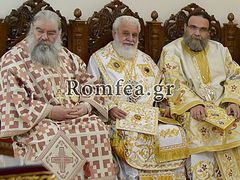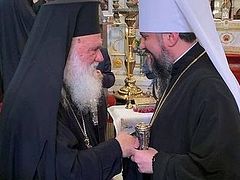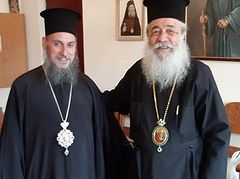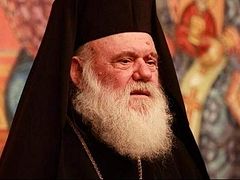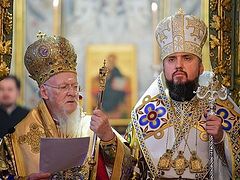Kiev, July 29, 2019
The OCU “Primate” Epiphany recently claimed, as the Union of Orthodox Journalists reported, that because a Greek Orthodox hierarch reportedly served with his bishops, this indicates de-facto recognition from the Church of Greece. Closer examination reveals this statement is a massive exercise in equivocation, if not an outright fabrication. Here is what actually happened, according to the Union of Orthodox Journalists:
Metropolitan Ioannis (Tassias), a Hierarch of the Church of Greece visited and served with Epiphany and the schismatics of the OCU in Saint Sophia’s Cathedral of Kiev. However, His Eminence is the Metropolitan of Langadas, which is part of the “New Lands” of the Church of Greece.
The New Lands (or New Territories) are a group of around 35 dioceses in Northern Greece which are under a very peculiar canonical position as a result of a complicated history with Constantinople. These territories are in fact, under a form of “duel subordination,” which is to say they are regarded as under the “stewardship” of the Church of Greece, however they are ultimately subject to the Throne of Constantinople. Six out of the twelve members of the Holy Synod of the Church of Greece are Metropolitans of the New Lands, effectively meaning Constantinople can (in)directly influence the Church of Greece via these hierarchs who are confirmed by and ultimately subject to his throne.
This situation was previously discussed in the article “About Good Doctor Aibolit and the Greek Orthodox Church.”
It is therefore incorrect and entirely misleading to assert that because Metropolitan Ioannis, a hierarch of the New Lands, served with the OCU, the Church of Greece effectively recognizes them. As a hierarch of the New Lands, Metropolitan Ioannis is ultimately subject to the Patriarchate of Constantinople, and in that capacity, he already de-facto recognizes who Constantinople recognizes.
This de-facto recognition, however, does not apply to the majority of the Church of Greece, which is directly answerable only to the Holy Synod and the Archbishop of Athens. Even if an individual hierarch of the Church of Greece proper did serve with the OCU, which has not yet happened, this still wouldn’t indicate any recognition from Greece, as only the Holy Synod can make this decision.
Many experts, especially acclaimed Greek priest and Theologian Fr. Theodore Zisis, have already noted that the issue is largely deadlocked in Athens. Reportedly, some members of the Greek Church were very concerned Constantinople may try and seize the New Lands if they didn’t support the OCU, whereas others pointed to this as evidence of the Phanar trying to control them.
It is worth noting though, that despite being under extreme political pressure, the Holy Synod of the Church of Greece has still not voted to recognize the schismatics, and this alone is a powerful sign.
Many Greek Hierarch have already outright condemned the schismatics, such as Metropolitans Seraphim of Piraeus (and here) Nektarios of Corfu, Paxoi, and the Diapontian Islands, Seraphim of Kythira, and Ambrose of Kalavryta. The Metropolis of Piraeus has also called upon the Synod not to recognize the Ukrainian schismatics.
Epiphany, however, continues to be confident that other Local Churches will slowly recognize the OCU. To this end, he even announced the creation of a Romanian Vicarate to attempt to coax the Romanian Orthodox Church into recognizing the OCU, though the recognition of a church should stand on canonical grounds alone.
While Metropolitan Ioannis serving with the OCU schismatics does not constitute de-facto recognition, due to him ultimately being subordinated to Constantinople, having a hierarch of the Church of Greece — who is ultimately under Constantinople at the same time—serving with the schismatics does not heal any situation, but simply further muddies the waters in this already confusing time.
Matfey Shaheen
Follow us on Facebook!


